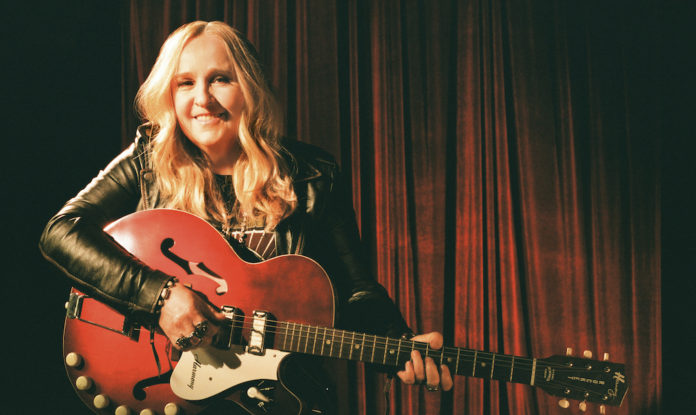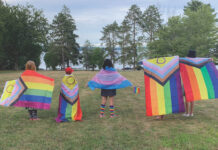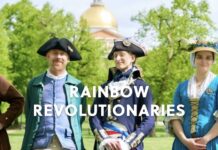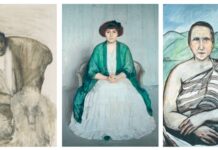[This article appears in the March/April 2022 issue of Boston Spirit magazine. Subscribe for free today.]
Even the biggest legends in the music business can still hide a few surprises up their sleeves.
Just look at Melissa Etheridge, a bona fide rock icon and pioneer for proudly out performers. Since she exploded onto the scene in the late ’80s, Etheridge has churned out the kind of timeless anthems most singer-songwriters could conjure only in their wildest dreams. But Etheridge has also been sitting on a treasure trove of previously unheard material that she never felt ready to release—until now.
Her latest album, “One Way Out,” is a characteristically barn-burning selection of songs that Etheridge wrote before she became the Grammy Award-winning, multiplatinum-selling artist we know today. All the familiar raw passion is there, though—and you’ll be able to feel it radiate from the stage when Etheridge brings her tour to the Colonial Theatre in Keene, NH (April 19); the Hampton Beach Casino Ballroom in Hampton Beach, NH (April 21); Bally’s Twin River Lincoln Casino Resort in Lincoln, RI (April 22); and City Winery in Boston (June 5, 6, 8 and 9).
Before she hits the road, we chatted with the star about her time as a student at Berklee College of Music in Boston, her trailblazing status and her upcoming book, “Heartstrings: Melissa Etheridge and Her Guitars,” a graphic novel about her collection of instruments named for other significant women in history.
[Spirit] What kept you from releasing the songs on “One Way Out” back when you wrote them?
[Etheridge] At that time, I was just starting to do interviews like this. I would call people and they would ask very personal questions about the music, because the music was very personal. I found myself thinking, “How can I tell this story without using pronouns? How do I do this?” I’d come up against a song like “Wild Wild Wild,” a song about having an affair with a married woman, a very tender song about a very intense thing. I felt, “Someone’s going to ask me about this.” There were a lot of things I kept away because I was just stumbling into all this—until I finally came out, and then there was freedom.
[Spirit] What do you remember about your time living in Boston?
[Etheridge] I spent a good year-and-a-half in Boston, and I was right out of high school so it was a very tender time. Boston was so beautiful, and the people were amazing. I have wonderful memories. I lived in a little studio above Newbury Street—back when you could live on Newbury Street for 80 bucks a week, you know? I had a view all the way down the street, and I still remember seeing in the summertime all the boys in short-shorts and roller skates rolling down the street. I love Boston. I grew up there, I came of age there, and I learned to be gay there.
[Spirit] Melissa Etheridge learned to be gay in Boston? Where?
[Etheridge] There was a club on Boylston Street called Buddies, and there would be a line outside. I’d go by and go, “That’s a gay bar!” Then I used to play in a restaurant called Ken’s by George. It was Ken’s Steakhouse’s try at a seafood restaurant at Boylston and Dartmouth. All these well-groomed yuppie women would come in, and finally, one of them said, “Hey, have you ever been to the bar around the corner?” It was called the Prelude. They’d take me in there, and I’d see all these beautiful professional women. It opened my eyes, as this little gay girl from Kansas, that I was not in Kansas anymore!
[Spirit] How did the city most impact you as a musician?
[Etheridge] There was a big punk scene in Boston, and I was a girl with an acoustic guitar who had my eye on a sort of country rock—the folk-rock of the Eagles, Joni Mitchell, Jackson Browne. I remember there was this female group called the Brats, this female-gay-punk-scary thing. I knew what I didn’t want to be. [Laughs] But still, Boston lit the fire in my heart and still has a place in my heart.
[Spirit] I know that “Heartstrings” will take a look at your guitars named for famous women. Do you choose the name to reflect the guitar’s personality?
[Etheridge] Oh yeah, definitely. RBG, that’s a solid bass guitar that I can count on. I also have a beautiful, shapely, gorgeously fascinating guitar that I call Cate Blanchett. There’s all different whys to the guitars.
[Spirit] Is it important to you to continue to be political through your music?
[Etheridge] I’ve stopped trying to please everyone. I find that if I stay in my own truth, I love myself, and I truly believe that I don’t need anybody else to change to make me safe or happy, then I can walk through this world and just be in it. And I celebrate our diversity, all of us. Especially here in America, we are all very different, and that’s what makes us beautiful and strong. I just keep walking with that.
Not a subscriber? Sign up today for a free subscription to Boston Spirit magazine, New England’s premier LGBT magazine. We will send you a copy of Boston Spirit 6 times per year and we never sell/rent our subscriber information. Click HERE to sign up!









